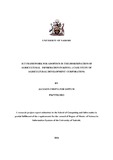| dc.description.abstract | The agricultural sector in Kenya is critical to the economy and it faces numerous challenges and constraints in the application and use of ICTs in the dissemination of agricultural information. Farmers are working in an information intensive environment and numerous studies have showed that information and communication technologies (ICTs) can play a vital role in the dissemination and transfer of agricultural information.
A descriptive research design was used in the study with a target of 120 respondents. The study used questionnaires as its main instrument with closed and open-ended questions. The researcher checked the completed questionnaires for completeness and consistency of the collected data. Coding and analysis of the collected data was done through SPSS(statistical package for social sciences) and the findings presented using tables, charts and graphs with the respective interpretation.
The purpose of this study was to investigate the role and contribution of ICTs as a means of disseminating relevant information and technological transfer to the Kenyan farmer. In particular, the research identified specific ICT tools (mobile, computer and radio) as the most appropriate alternatives used by various stakeholders in the dissemination of information in the agricultural sector. The research highlighted the challenges that confront farmers and a framework was proposed to effectively resolve farmers and stakeholders perennial challenges in information dissemination, storage and sharing of knowledge and experiences.
The objective of developing the framework was to establish a clear communication channel between farmers, extension agents, agricultural experts, research centers, and the community. While validating the framework, the findings showed that the relationship between all variables was mutual and information disseminated was based on farmers’ needs and feedback. Internet was used as the ICT technology to transfer the agricultural information to the farming community, and that since some farmers were semi-illiterate, they did not have to use the internet directly but through extension agents.
In conclusion, despite the constraints and challenges encountered in the application and use of ICTs in the agricultural sector, the study established that a wide range of ICTs ( computer, cell phone & radio) had been used and the framework proposed to facilitate information dissemination and sharing among agricultural researchers and the farmers in Kenya. | en_US |



